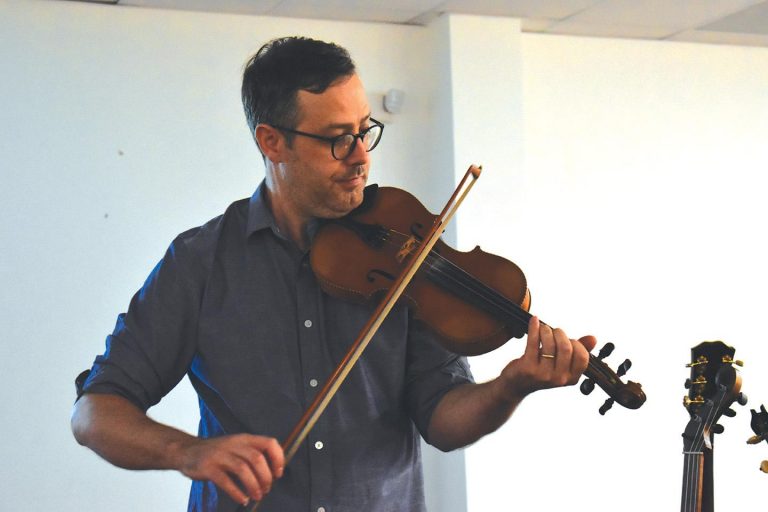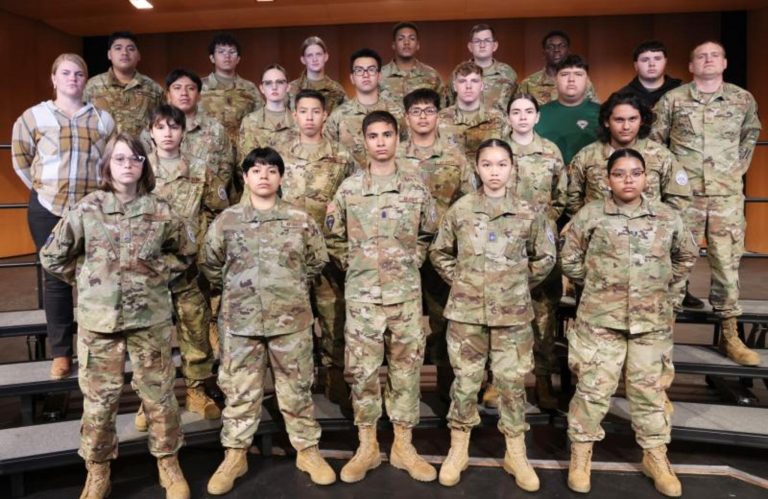Whitney Hodgin
Dodge City Globe
Perhaps Kansas musicians of yore are less well known because folks in this state don’t like to toot their own horn, surmised historian and fiddler Derrick Doty.
The Manhattan man and his two sons traveled to Dodge City Founders Weekend, where he spoke to patrons of the Dodge City Public Library on the history of music in Kansas. The trip was made possible thanks to a Humanities Kansas grant.
“What do we focus on when we discuss history?” Doty asked. “We focus on military engagements, political activities, people and geography – the music is not usually part of it, but it’s always there whether you see it or not.
“Settlers who brought their music impacted their community as well as future generations. Different traditions of music in Kansas still continue today. There are early stories still told, and dances still danced, even though we don’t see it in our communities as much anymore.”
Fiddlers have occupied Kansas since the territory opened but because leisure activities were not as well documented, Doty spent years pouring over letters, diaries and books in search of gems to present his fellow Kansans.
“Missouri has a rich fiddling history that was capitalized on and well documented,” he said. “That doesn’t mean we didn’t have those things going on, but we didn’t toot our own horn.”
This editor learned Mandolin clubs were like the pickle ball clubs of the 1890s and that a banjo can live forever if cared for properly.
Many of the early banjos did not survive wire strings introduced in the twentieth century, Doty said.
And while it appears that music was male dominated, that wasn’t always the case.
“The women probably had their hands busy and didn’t have the pleasure time,” he said. “But it wasn’t unusual to see all-lady brass bands in cities like Herrington, White City and Udall.”
Similarly, African American musicians were also looked over even though they, too, were here in the beginning.
“Musicians of color were everywhere in Kansas,” he said.
One of the world’s greatest coronet players, Perry “PG” Lowery” (1869-1942) was from Kansas and became the first colored band member to play under the big top for Barnum and Bailey’s Circus.
For a playlist of early Kansas musicians Doty spoke of in his presentation log in to www.dodgeglobe.com or visit the pinned post at the top of @DodgeCityGlobe on Facebook.
Follow Doty on Facebook and read his blog flinthillsfiddler.wordpress.com. Hear his music on Spotify! He plays with Annie Wilson and Carl Reed.
Email the writer whodgin@cherryroad.com.
Doty spoke of this poem that was set to music at the time of Kansas’ founding titled
“Song of the Kansas Emigrants”
By John Greenleaf Whittier
We cross the prairie as of old
The pilgrims crossed the sea,
To make the West, as they the East,
The homestead of the free!
We go to rear a wall of men
On Freedom’s southern line,
And plant beside the cotton-tree
The rugged Northern pine!
We’re flowing from our native hills
As our free rivers flow;
The blessing of our Mother-land
Is on us as we go.
We go to plant her common schools
On distant prairie swells,
And give the Sabbaths of the wild
The music of her bells.
Upbearing, like the Ark of old,
The Bible in our van,
We go to test the truth of God
Against the fraud of man.
No pause, nor rest, save where the streams
That feed the Kansas run,
Save where our Pilgrim gonfalon
Shall flout the setting sun!
We’ll tread the prairie as of old
Our fathers sailed the sea,
And make the West, as they the East,
The homestead of the free!



